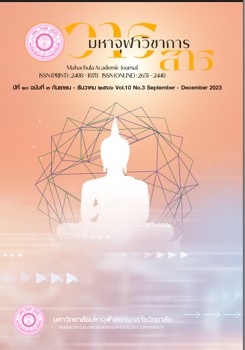Stress and Coping Strategies in Medical Students at Clinical Level, Faculty of Medicine Ramathibodi Hospital, Mahidol University
Main Article Content
Abstract
The objectives of this research were (1) to study the level of stress in each aspect. and stress management model of medical students in clinical level. (2) to compare the stress of medical students in clinical level, classified according to different personal factors. (3) to study the relationship between stress and coping strategies. The sample used in the research were clinical medical students in Faculty of Medicine Ramathibodi Hospital, Mahidol University, academic year 2022. A total of 117 people, use the Proportional stratified random sampling technique. Tools were used, namely questionnaires and data analysis with software packages. Statistics used for data analysis were percentage, mean, and standard deviation, T-test, F-test for all tests by LSD (Least Significant Difference) and Pearson's affinity coefficient. Statistical significance was set at the .05 and .01 levels.
The results showed that (1) medical students had the average stress level was in the middle level, average level of stress source at the middle level and stress level overall, it was at a high level. (2) medical students chose problem focused coping as a coping method at a relatively high level. Use an emotional focused coping and avoidant coping approach to stress
management at relatively low level . 3) medical students with different genders had different overall stress levels in terms of sources of stress and symptoms of stress at statistical significance at the .01 level. Clinical medical students with different levels had different overall stress levels in terms of sources of stress at the statistical significance of .05 and medical students with and without family members with different medical conditions had different overall levels of stress in terms of sources and symptoms of stress. Statistically significant at the .05 level. 4) Emotion focused coping was positively correlated with sources of stress and symptoms of stress. with statistical significance at the .01 and .05 levels, respectively and avoidant coping stress management had a positive correlation with stress sensitivity stress, source of stress and symptoms of stress statistically significant at the .01 level.
Article Details

This work is licensed under a Creative Commons Attribution-NonCommercial-NoDerivatives 4.0 International License.
References
คณะแพทยศาสตร์โรงพยาบาลรามาธิบดี มหาวิทยาลัยมหิดล. คู่มือนักศึกษา หลักสูตรแพทยศาสตรบัณฑิต คณะแพทยศาสตร์ โรงพยาบาลรามาธิบดี. กรุงเทพมหานคร: คณะแพทยศาสตร์ โรงพยาบาลรามาธิบดี มหาวิทยาลัยมหิดล, ๒๕๖๑.
ธนานันต์ นุ่มแสง และ ธนิตา ตันตระรุ่งโรจน์. “การทดสอบความเที่ยงตรงและความเชื่อมั่นของแบบประเมินกลยุทธ์ในการรับมือกับความเครียด แบบสั้นฉบับภาษาไทย”. วารสารสมาคมจิตแพทย์แห่งประเทศไทย. ปีที่ ๖๓ ฉบับที่ ๒ (เมษายน – มิถุนายน ๒๕๖๑) : ๑๘๙.
ปิยพล ปราบชมภู, ศุภารัตน์ สกุลพานิช, ชนกานต์ ดวนใหญ่, ภัทรสุดา ฟองงาม, นลินี แข็งแอ และ จิรวัฒน์ มูลศาสตร์. “ความเครียดและการจัดการความเครียดของนักศึกษาแพทย์ชั้นคลินิก โรงพยาบาลสรรพสิทธิประสงค์”. วารสารสรรพสิทธิเวชสาร. ปีที่ ๓๖ ฉบับที่ ๒ (พฤษภาคม-สิงหาคม ๒๕๕๘) : ๑๑๑.
ศิวาพร จี้ปัน. “ความเครียดและการจัดการความเครียดของเยาวชนในอำเภอบ้านธิ จังหวัดลำพูน”. การค้นคว้าแบบอิสระสาธารณสุขศาสตรมหาบัณฑิต. บัณฑิตวิทยาลัย: มหาวิทยาลัยเชียงใหม่, ๒๕๕๑.
สิรินิตย์ พรรณหาญ, บุญมี พันธุ์ไทย และกมลทิพย์ ศรีหาเศษ. “ปัจจัยที่มีผลต่อความเครียดในการเรียนของนักศึกษาแพทย์ชั้นคลินิก ชั้นปีที่ ๔-๖”. วารสาร Veridian E-Journal Silpakorn University (ฉบับภาษาไทย มนุษยศาสตร์ สังคมศาสตร์ และ ศิลปะ). ปีที่ ๑๑ ฉบับที่ ๓ (กันยายน-ธันวาคม ๒๕๖๑) : ๒๕๘๒-๘๖.
สุภาภัทร ทนเถื่อน. “การศึกษาความเครียดและวิธีเผชิญความเครียดของนักเรียนมัธยมศึกษาตอนปลาย”. สารนิพนธ์การศึกษามหาบัณฑิต สาขาจิตวิทยาพัฒนาการ. บัณฑิตวิทยาลัย: มหาวิทยาลัยศรีนครินทรวิโรฒ, ๒๕๕๓.
สุวัฒน์ มหัตนิรันดร์กุล, วนิดา พุ่มไพศาลชัย และพิมพ์มาศ ตาปัญญา. “การสร้างแบบวัดความเครียดสวนปรุง”. วารสารสวนปรุง. ปีที่ ๑๓ ฉบับที่ ๓ (กันยายน ๒๕๔๐-เมษายน ๒๕๔๑) : ๑๒.
สุวรรณา สี่สมประสงค์. “การศึกษาความเครียดของนักศึกษาแพทย์ระดับชั้นปีที่ ๔-๖”. สารนิพนธ์การศึกษามหาบัณฑิต สาขาจิตวิทยาการแนะแนว. บัณฑิตวิทยาลัย: มหาวิทยาลัยศรีนครินทรวิโรฒ, ๒๕๕๒.


